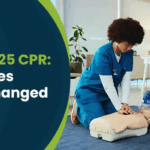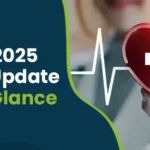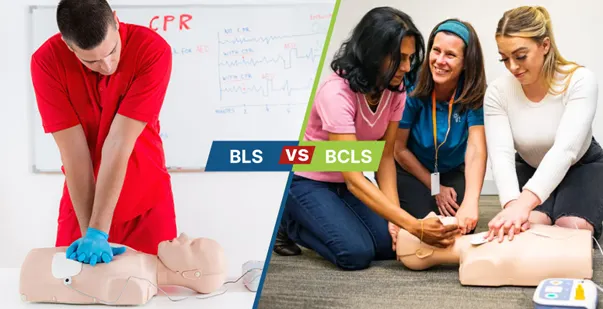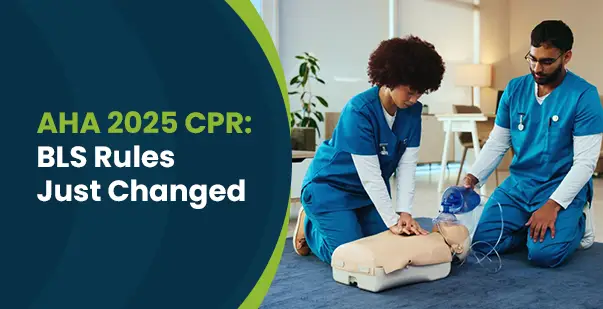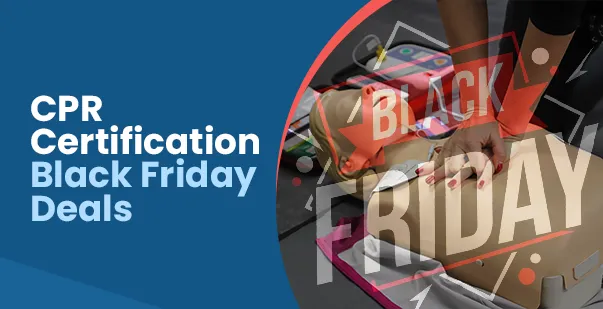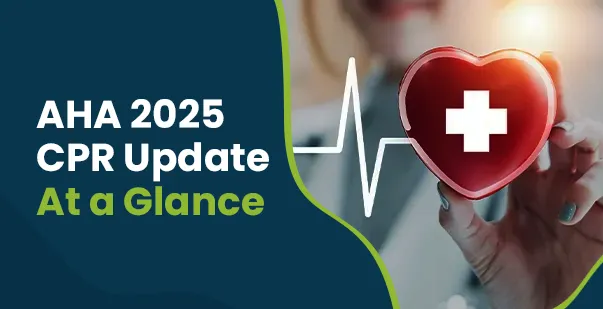Have you ever wondered which certification prepares you to act when seconds count? Most healthcare employers prefer professionals who are certified from basic life support. Meanwhile, non-medical first responders hold basic cardiac life support certifications. These are professionals who do not have medical training, but may be trained in basic first aid or CPR. They can provide immediate support until professional medical help arrives.
This highlights its role as an entry-level life-saving credential. Both the certifications are life-saving. But the question is, which one aligns with your goals? Let us explore the differences and understand why choosing the right certification matters.
What is BLS?
Basic life support certification teaches important life-saving skills. It teaches cardiopulmonary resuscitation, using an automated external defibrillator and ways to prevent choking. BLS teaches healthcare professionals such as nurses, doctors, and paramedics. It teaches how to be a team player in critical situations and act confidently.
What is BCLS?
BCLS teaches basic emergency response skills. It involves steps to perform CPR using an AED and helps recognize early signs of a heart emergency. BCLS is for people who are not in the medical field but are teachers, daycare providers or workplace safety officers. The courses focus more on the basics of CPR, AED usage, and choking management. On the other hand, BLS discusses advanced protocols for handling emergencies in medical settings. It teaches immediate life-saving measures while waiting for healthcare professionals.
BLS vs. BCLS Certification
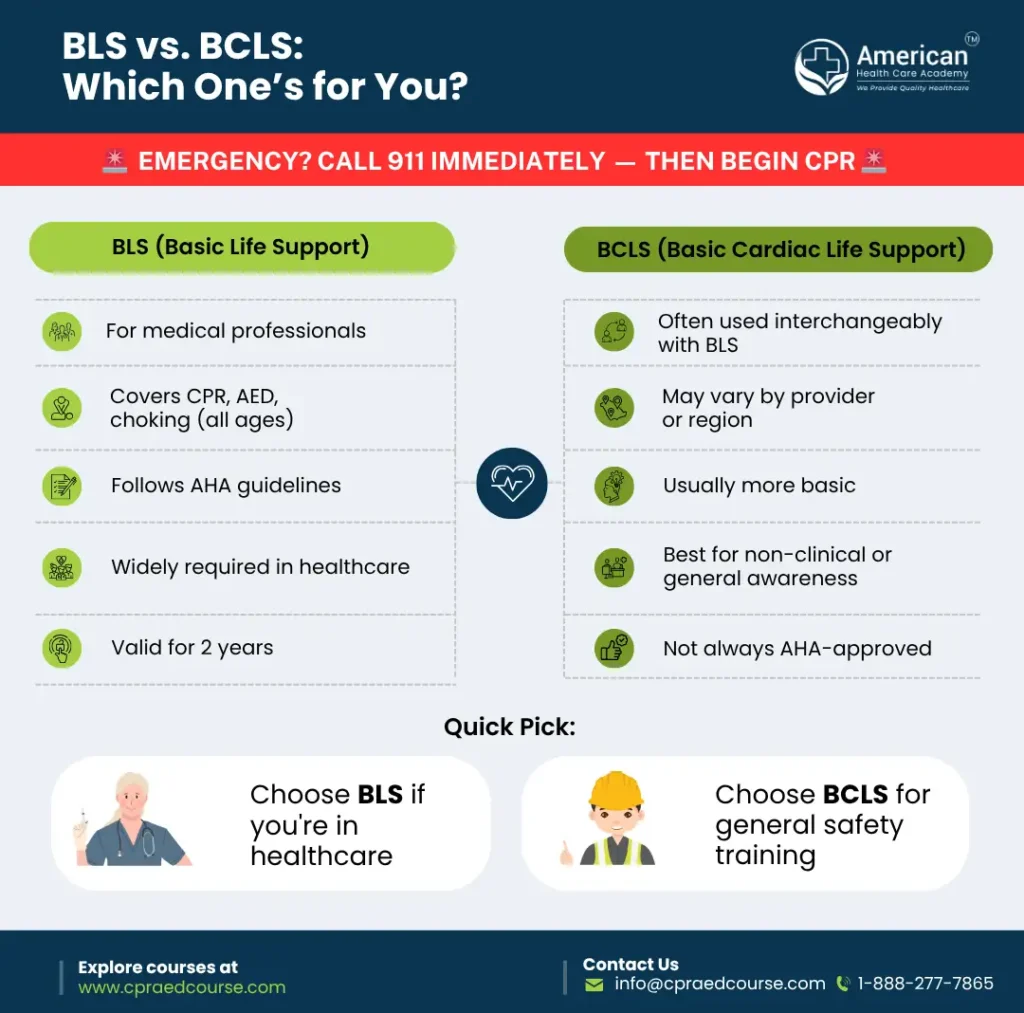
It can be difficult to choose between BLS and BCLS. Both certifications focus on teaching life-saving techniques. However they are targeted towards different audiences. Both are important for different purposes and one may not necessarily be ‘better’ than the other. So it depends on the individual’s roles and needs.
What are the benefits of a BLS certification?
The BLS Certification is a must if you are a medical professional and want to equip yourself with life. Here are some of the common benefits:
Emergency response skills
Students learn to perform and effectively perform CPR. They also learn to properly analyze for, apply, and use an AED. This enables the medical response professional to restore proper functioning of the heart.
Enhances life-saving skills
BLS Certification offers critical skills such as CPR and using AED. It also teaches how to manage emergencies such as cardiac arrest or choking. These are well-proven techniques when applied on time. It prepares you to act confidently in critical times. If you are BLS trained, you can provide immediate care until the professionals arrive.
Boosts career opportunities
BLS certification is mandatory for several jobs. This credential is beneficial for clinics, hospitals and other organizations. It prepares you for emergencies and gives you credit if you have a BLS certification.
Makes you confident
One of the best ways that BLS Certification can help you is by making you confident. When you know that you have the skills needed to help someone in an emergency, it prepares you to think swiftly. You can take effective actions at all times.
Helps you comply with regulations
This education helps you gain the skills needed to meet the compliance requirements. This includes those established and maintained by regulatory bodies. This includes employers and professional organizations in healthcare.
Teaches teamwork
BLS Certification emphasizes the importance of working as a team during emergencies. It teaches steps to coordinate effectively while performing CPR and using an AED. This approach is vital in hospitals and also for emergency response teams. It makes you a leader and helps you take the role in community or workplace emergencies.
Improves workplace and community safety
BLS-certified individuals enhance safety, enabling them to respond to accidents and cardiac arrests. It creates a safer environment for everyone and ensures an effective response. It is highly advantageous for organizations. They can benefit from having employees equipped to handle emergencies.
What Are The Benefits of a BCLS Certification?
A BCLS certification equips you with key life-saving skills to handle emergencies such as choking or cardiac arrest. It is ideal for non-medical individuals and those starting their journey in emergency response training. This certification is ideal for gaining knowledge and being confident in critical situations. Let us explore the benefits of a BCLS certification:
1. Provides basic emergency response skills
A BCLS certification trains individuals in CPR, AED usage, and recognizing cardiac or breathing emergencies. The skills equip you to help during emergencies before any professional arrives.
2. Builds confidence in handling emergencies
One of the most valuable aspects of BCLS certification is the confidence it instills in participants. When you know you can help someone, it makes you confident and reduces panic. This enables you to act swiftly and be calm during tiring times.
3. Ideal for non-medical professionals
BCLS is applicable for individuals who are not in the medical field but want to be prepared for emergencies. It is ideal for teachers, and childcare providers. It is easy to understand and teach practical scenarios. This makes it accessible and relevant for everyone.
4. Enhances workplace safety
Having BCLS-certified individuals in a workplace improves overall safety standards. These employees can effectively respond to medical incidents and reduce risks. Many organizations prefer or require staff to have basic life-saving certifications to meet safety compliance.
5. Easy to Obtain and Time-Efficient
BCLS certification courses are straightforward and time-efficient. This makes them ideal for busy individuals. They are self-paced and provide flexibility. The certification process is quick, usually completed in a few hours, yet covers all the essential emergency response skills. Anyone can take this course who wants to learn life-saving skills.
Read more: What Is BLS and What Does It Involve in Healthcare?
Steps to Determine Which One is Best For You
- Your career goal
If you’re a healthcare professional or plan to work in medical settings, BLS is the clear choice. It’s often a mandatory certification for roles like doctors, nurses, EMTs, and paramedics. BLS provides advanced training in CPR, AED usage, airway management, and team-based resuscitation, preparing you for high-pressure medical emergencies. If your work doesn’t involve healthcare but you want to be prepared for emergencies, BCLS might be enough. It’s ideal for teachers, workplace safety teams, or anyone looking to assist in basic emergencies.
- Skill level needed
BLS is more comprehensive, designed for professionals who need to handle complex emergency scenarios. It emphasizes teamwork and advanced protocols. BCLS focuses on foundational life-saving skills like CPR and AED usage. It’s perfect for those who need basic knowledge without diving into detailed medical protocols.
- Certification requirements
Check what’s required for your job or desired role. Many healthcare positions list BLS certification as a prerequisite. However, general workplaces may accept BCLS for compliance. If you’re unsure, research industry or job-specific guidelines to make an informed choice.
- Time and commitment
BLS courses tend to be more detailed and may require a greater time investment, including hands-on practice and assessments. BCLS courses are shorter and more straightforward, making them a good option if you need basic skills quickly.
- Future opportunities
If you’re considering a future in healthcare, BLS is more prospective. It ensures you’re well prepared for professional emergencies. For those outside the medical field, BCLS helps you to be prepared and take immediate action.
Who Needs BLS Certification?
BLS certification is for healthcare professionals and first responders, although anyone can benefit from this course. It is ideal for non-medical first responders, like firefighters, police officers, or even trained bystanders. Healthcare workers like nurses, doctors, EMTs, and paramedics have special training to treat injuries and illnesses. Dentists also handle emergencies related to teeth and mouth injuries. Basic Life Support (BLS) training is important for all these roles because it teaches how to do CPR, clear airways, and assist someone during cardiac emergencies.
Who Needs BCLS Certification?
BCLS certification is ideal for volunteers or anyone involved in community services where immediate emergency response may be necessary. It is best for people who do not work in healthcare but want to help save lives. It is also suitable if you work in schools, fitness centers, recreational facilities and workplace safety teams.
Read more: How BLS and CPR Certifications Serve Different Professional Needs
Choose the Best Certification For Your Needs
Both BLS and BCLS certifications are valuable. They serve different purposes and depend on your career goals. BLS certification is ideal for healthcare professionals who want to seek advanced training.
BCLS certification is for non-medical individuals who want to learn life-saving skills and ensure workplace safety. BLS creates more professional opportunities. BCLS equips you to help during critical times. Both certifications are crucial, but you need to choose the one that meets your needs.
FAQs
1. Is a BLS the same as BCLS?
BLS and BCLS are used interchangeably. Both terms refer to the foundational skills required to provide life-saving interventions. This includes chest compressions and rescue breathing. BLS is the more commonly used term today in healthcare training and certifications.
2. What is BCLS in medical terms?
BCLS stands for Basic Cardiac Life Support. It refers to a set of medical techniques. These are procedures that assist individuals experiencing cardiac arrest or other life-threatening conditions. These include skills like CPR, airway management, and the use of an Automated External Defibrillator.
3. What is the difference between BLS and CPR?
BLS involve different skills such as CPR, airway management, and the use of an AED. These are ideal for healthcare providers. Cardiopulmonary Resuscitation is a life-saving technique that involves chest compressions and rescue breathing. CPR is a key component of BLS, but BLS covers additional training and scenarios.
4. Is ACLS different from BLS?
Yes, Advanced Cardiovascular Life Support is different from BLS. While BLS focuses on basic skills like CPR and AED use, ACLS includes advanced techniques such as administering medications, interpreting ECGs, and managing more complex emergencies. ACLS is ideal for healthcare professionals who handle critical care situations. BLS is more foundational.
